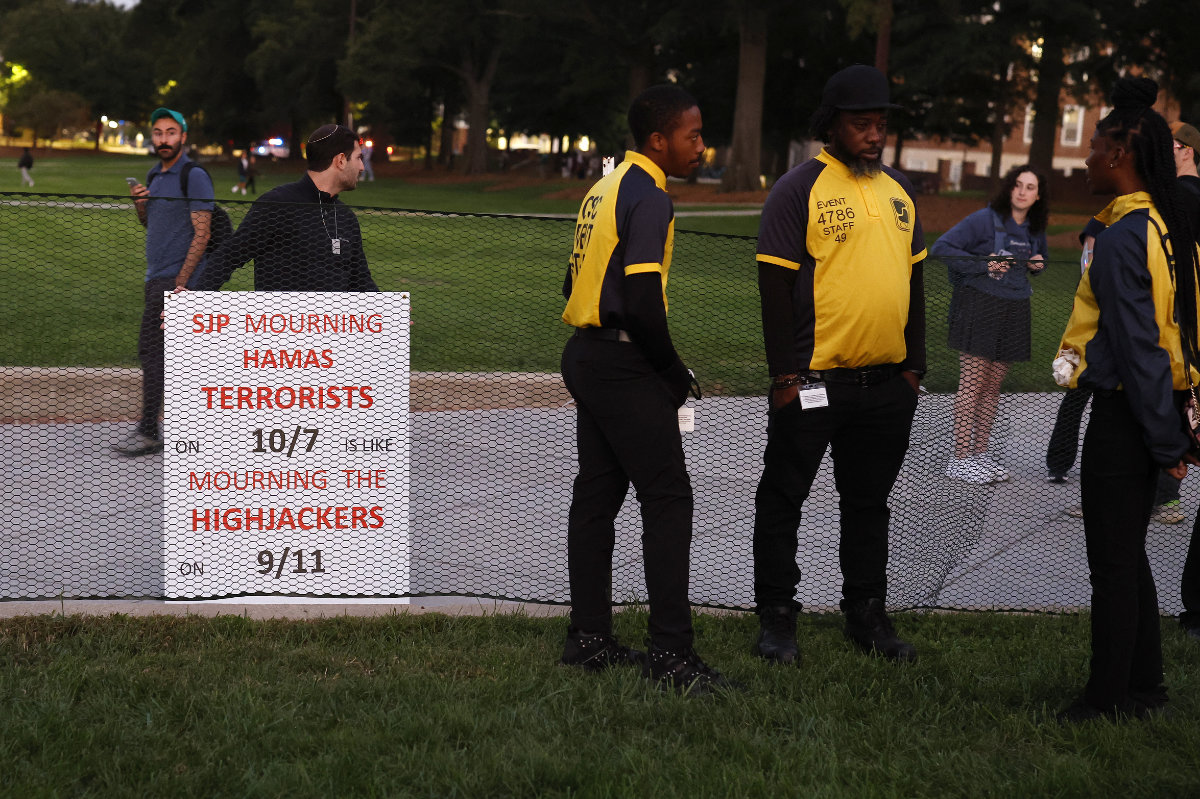BEIRUT: Lebanon said Israeli air strikes on Saturday killed more than 55 people, many of them in central Beirut, as Israel’s defense minister vowed decisive action against Hezbollah, in a call with his US counterpart.
It was one of the deadliest strikes in a day since Israel escalated air strikes against Hezbollah targets in Lebanon on September 23, after nearly a year of limited cross-border exchanges of fire, in which Lebanon’s Hezbollah said it was acting in support of Hamas.
One strike on Saturday in the heart of Beirut brought down a residential building and jolted residents across the city.
The strike on the working-class Basta neighborhood killed at least 20 people and wounded 66, Lebanon’s health ministry said in a revised toll.
A Lebanese security source told AFP that the central Beirut strike had “targeted a leading Hezbollah figure,” but a Hezbollah lawmaker, Amin Sherri, denied to Lebanese media that any official was present at the time of the attack.
Similar strikes carried out without warning outside of Hezbollah’s traditional bastions — which include southern Beirut but not the center — have tended to target senior figures.
The health ministry said Israeli air strikes also hit eastern Lebanon, killing 24 people including 13 in the town of Shmostar overlooking the Bekaa Valley, another Hezbollah stronghold.
In Lebanon’s south, at least 14 were killed including five in the coastal city of Tyre, the ministry said.
Rude awakening
Residents in Beirut's Basta neighborhood were asleep and had not been given prior warning to evacuate, according to a civil defense source.
Four bunker buster missiles hit the building in the densely populated Al-Ma’moun Street.
It resulted in the complete or partial destruction of adjacent structures, while the targeted building was reduced to rubble, leaving a deep crater.
The sheer number of residents who sustained various injuries overwhelmed local hospitals that issued urgent calls for blood donations.
“We saw two dead people on the ground... The children started crying and their mother cried even more,” said Samir, 60, who lives in a building facing the one destroyed.
The attack in the capital was followed by others in the city’s southern suburbs after calls by the Israeli military to evacuate.
Israel has not commented on the strike in central Beirut but said it had again hit Hezbollah targets in the city’s southern suburbs, a stronghold of the Iran-backed group.
A military statement said that over the past week, the air force “struck dozens of Hezbollah command centers, weapons storage facilities, and terrorist infrastructure in the Dahieh area.”
Survivors recounted the moments of terror they experienced during the airstrikes and how they narrowly escaped death as parts of their homes collapsed.
Among the victims of the raid was a family of 10 from the southern town of Shaqra’s Hourani family. They had been displaced to the Al-Salam neighborhood in the southern suburbs of Beirut but chose to move to Basta, “believing it offered greater security than the southern suburbs,” according to a relative.
The bunker buster munitions resembled those used in the assassinations of the former chief of Hezbollah, Hassan Nasrallah, and another top official, Hashem Safieddine.
A building about 100 meters from the new target was attacked about a month ago.
Confusion over the targets
About 12 hours after the raid that shook Beirut and its suburbs, Hezbollah MP Amin Sherri, while inspecting the targeted site in Basta, said: “There was no Hezbollah member in the targeted building.”
Information circulating at the time of the airstrikes suggested that the target of the raid was a “prominent Hezbollah leader” taking part in a leadership meeting.
Israeli Channel 12 reported that the “target was Sheikh Naim Qassem, the secretary-general of Hezbollah.”
But the Israel Broadcasting Authority reported in the morning, citing a security source, that the target was Hezbollah official Mohammed Haidar.
However, the Israeli source did not confirm at the time whether he was killed or survived.
Haidar, a former member of Lebanese parliament, represented the Marjayoun-Hasbaya district from 2005 to 2009.
He served as a military aide to Nasrallah and was a member of the Jihad Council, regarded as Hezbollah’s highest executive leadership for military and security operations.
Haidar is one of the three prominent members of the council alongside Talal Hamieh and Khudar Yussuf Nader.
Additionally, Haidar serves as head of Hezbollah’s operations room.
Channel 12’s military reporter said that the official “was residing in a hidden apartment,” adding that the Basta attack “was an attempt to assassinate him.”
Israeli attacks against Beirut, especially against Hezbollah commanders, prompted internal backlash.
Independent MP Waddah Sadek said: “Hezbollah should take the moral and courageous decision of protecting Beirut’s residents and displaced people.
“Beirut is not an operation area, but a city that welcomed our displaced people only.”
Former Beirut MP Rola Al-Tabesh said: “The magnitude of the Israeli enemy’s criminality and blood-shedding is condemned and indescribable.”
Diplomatic solution
In a telephone call with Israeli Defense Minister Israel Katz on Saturday, Washington's Defense Secretary Lloyd Austin “reiterated US commitment to a diplomatic resolution in Lebanon that allows Israeli and Lebanese civilians to return safely to their homes on both sides of the border,” a Pentagon spokesperson said.
A spokesman for Katz said he commended the US efforts toward “de-escalation in Lebanon” and underscored that Israel would “continue to act decisively in response to Hezbollah’s attacks on civilian populations in Israel.”
United States envoy Amos Hochstein was in Lebanon and Israel this week, meeting with both countries’ senior officials, to try to negotiate an end to the war.
After talks in Beirut he said a deal was “within our grasp” but as he headed to Israel both sides put out statements that dented hopes of rapid progress.
Lebanon says more than 3,670 people have been killed in the country since October 2023. Most of the deaths have been since September this year.
Hamas’s October 7, 2023 attack on Israel that triggered the Gaza war resulted in the deaths of 1,206 people, mostly civilians, according to an AFP tally of Israeli official figures.
Israel’s retaliatory campaign in Gaza has killed at least 44,176 people, most of them civilians, according to data from the Hamas-run territory’s health ministry, which the United Nations considers reliable.
In the pre-dawn darkness of Gaza on Saturday, one strike killed seven people including children at a house in the Zeitun area of Gaza City, civil defense agency spokesman Mahmud Bassal told AFP.
AFPTV footage showed victims being brought in to Al-Ahli Arab Hospital including a bloody and dust-covered man, as a boy on a bed beside him struggled to reach the man and called for his father.
“We were sleeping, I was lying here. What happened?” one survivor, Abu Shaker Shaldan, said, lost for words at the scene of the strike, with blood trickling down his head.
Tensions escalate
Meanwhile, confrontations between the Israeli army and Hezbollah have escalated, reaching the second line of villages across the southern Lebanese border.
The escalation included Baalbek, Brital and Chmistar, where three children and their mother were killed.
Israeli drones targeted several fishermen on the beach of Tyre, killing two.
Hezbollah said it was now using cruise missiles to target Israeli military outposts in northern Israel.
Beirut’s southern suburb has been subject to a series of Israeli raids since the early morning. The airstrikes targeted not only single houses and buildings, but also residential and commercial compounds.
The attacks were preceded by evacuation warnings issued by the Israeli army, along with a map showing the targeted locations.
Raids reached Burj Al-Barajneh, Hadath, Choueifat, Amrousieh near the Lebanese University and Haret Hreik.
The Israeli army claimed that it targeted “many Hezbollah headquarters, weapon depots and military infrastructure.”
Clashes intensified in the southern town of Khiam between Hezbollah and the Israeli army amid fierce militant resistance.
The Israeli army carried out detonations, described as “very violent,” in the heart of the town, and homes were destroyed in Shamaa and Tayr Harfa, which the Israeli army entered a few days earlier.
Reports suggested that the Israeli army took control of large areas of the coastal town of Al-Bayada.
Media reports spoke of Israeli soldiers entering between the border towns of Al-Taybeh and Rab Al-Thalathin.
The Israeli army fired heavy munitions toward the outskirts of the town of Naqoura.
Several people were killed in Israeli airstrikes targeting motorcycles on the roads in the Tyre and Bint Jbeil districts.
Airstrikes targeted frontline and second-line towns, and in the city of Bint Jbeil, about 50 shells hit residential neighborhoods within a two-hour period.
Israeli jets struck Chehabiyeh and Zefta, killing three people, and the vicinity of Al-Bazourieh, Chaaitiyeh and Roumine, where five people were killed, as well as Khirbet Selm and Mayfadoun.
Airstrikes hit the town of Roum in the Jezzine district, resulting in three deaths and two injuries.
- With Agencies































